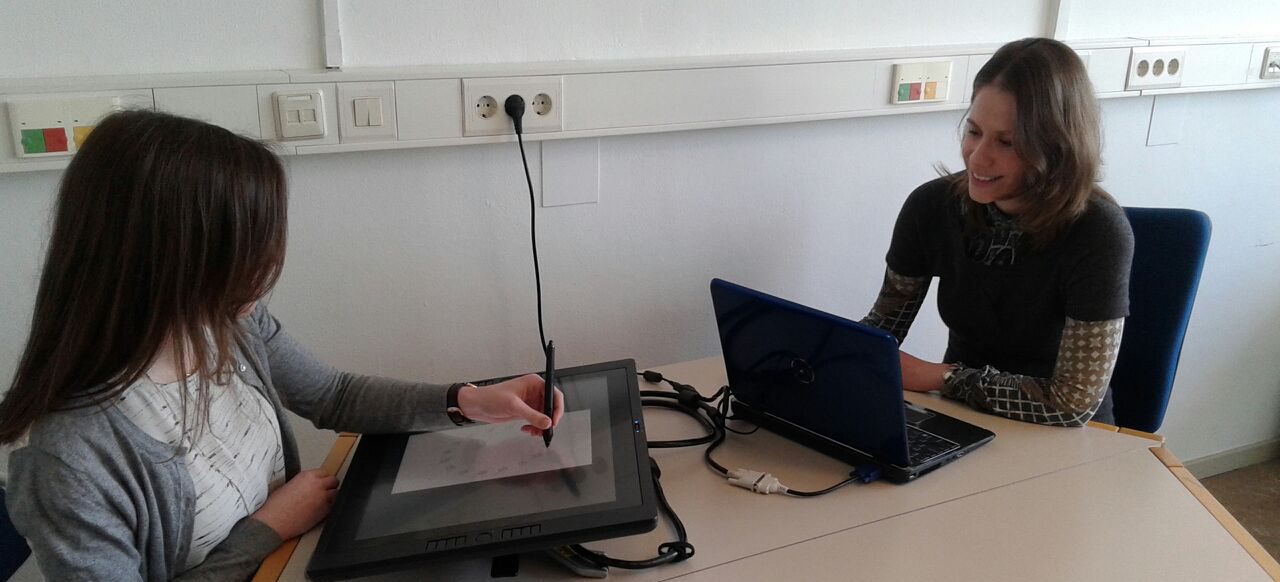Scopa-Cog

Clinical Psychologist Sandra Eygelshoven.
The SCales for Outcomes in PArkinson’s disease-COGnition (SCOPA-COG) has specifically been constructed for people with Parkinson’s Disease and tests the non-verbal and verbal memory, learning, attention, and executive function, including complex motor planning, working memory, and verbal fluency.
The tests have been digitized and norm data have been collected in the context of research by clinical psychologist Sandra Eygelshoven.
Publications on SCOPA-COG
Are non-demented patients with Parkinson’s disease able to decide about their own treatment?
Eygelshoven, S., Van den Hout, A., Tucha, L., Fuermaier, A. B. M., Bangma, D. F., Thome, J., Lobbestael, J., Tucha, O. & Koerts, J. (2017). Parkinsonism & related disorders, 38, 48 – 53
Assessment of cognition in Parkinson’s disease.
Marinus, J., Visser, M., Verwey, N. A., Verhey, F. R. J., Middelkoop, H. A. M., Stiggelbout, A. M., & Van Hilten, J. J. (2003). Neurology, 61(9), 1222–1228.
Summary Research Sandra Eygelshoven
Parkinson’s Disease is characterised by a progressive degeneration of dopaminergic neurons. Individual physiological conditions, such as stress, may play a role in the onset, the diversity in symptoms and the course of Parkinson’s Disease. This hypotheses is part of a longitudinal study by Sandra Eygelshoven, MSc., clinical psychologist at Zuyderland Medical Centre et al. in cooperation with Groningen University. Patients’ stress levels have been registered during two years using a Daily Problems Checklist, online, in the webbrowser. Immediate, delayed and recognition memory were measured by using the 15 Word Learning Test (15 WLT) during the baseline and the follow-up assessments. Furthermore, the digital version of the Scopa-Cog battery, as well as the MAAS Concept Shifting Task (CST) and Letter-Digit Substitution Test (LDST) were used for measuring cognitive functioning. The Metrisquare DigiDiag software (former: DiagnoseIS software) was used to administer these tests.
Attention
Available in DigiDiag

Counting backwards
The subject is instructed to count down from 30 to 0 in steps of three.

Months backwards
The subject lists the months of the year in reverse order.
Memory and learning
Available in DigiDiag

Words reminder task
Ten words are presented visually for 4 seconds each time. The subject reads these words out loud and is instructed to remember as many of them as possible. When all the words are, the subject lists all the words he still knows. There is no time limit or sequence to recall. After all other genomes have been taken, the test subject is asked again which words the test subject still remembers.

Span backwards
The examiner reads an increasingly longer series of numbers. The subject repeats these in reverse order.

Point to cubes
Squares / blocks are shown on the tablet. An image of a pen automatically shows the order in which the cubes must be pointed one by one with the pen on the tablet by the subject.
Executive functions
Available in DigiDiag

Fist-stretch-palm
Pictures of the correct position of the hand are shown on the test leader’s laptop. This series is shown to the patient 5 times by the examiner, after which the patient carries out the series independently.

Semantic Word Fluency
The subject lists as many animals as possible in one minute. The test leader enters these words directly using the laptop.

Dices
The subject is asked to answer the number of pips of the die shown on the tablet at a certain regularity. The corresponding line remains on the screen. In the second condition, dice are shown again, but the answer rule changes. This line again remains visible to the test subject.
Visuo-spatial functions
Available in DigiDiag

Complete figures
The subject is shown 5 incomplete figures and must always choose 2 or 3 shapes from 4 or 5 possible alternatives to complete the figure. The examiner indicates on their own examiner screen which shapes the patient has chosen by listing the corresponding number.
References
In a prospective longitudinal cohort study which investigates whether stress is of influence on cognitive functioning and the acceleration of cognitive degeneration in Parkinson’s disease, I am using DiagnoseIS for neuropsychological assessment and measurements of stress. Stress is measured by a stress questionnaire and VAS-scales designed using the Metrisquare test development module (former: DiagnoseIS development module). Participants are enabled to fill out questionnaires at home online during the study. Using DigiDiag (former: DiagnoseIS), the following neuropsychological tests are conducted: Stroop Color Word Test, Concept Shifting Test, Letter-Digit Substitution Test, Verbal Learning Test and the SCOPA-COG battery.

